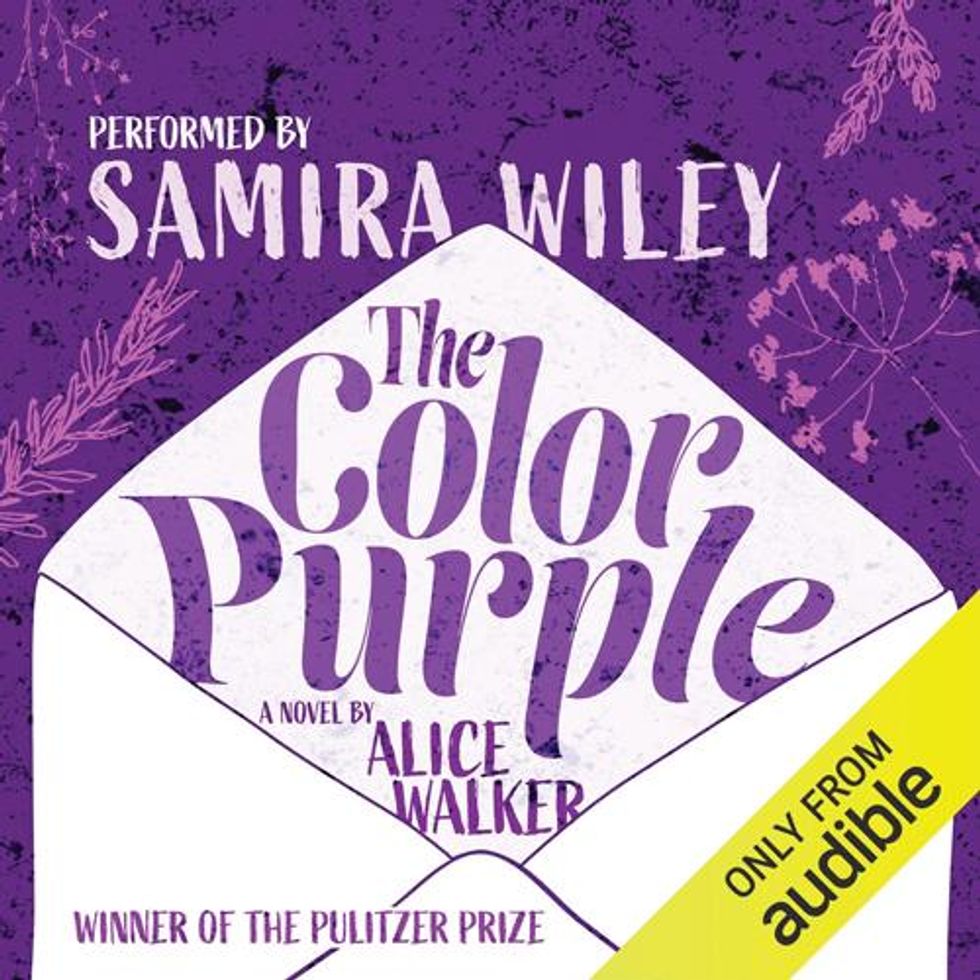"I think it pisses God off if you walk by the color purple in a field some where and don't notice it," Samira Wiley says is her favorite line from Alice Walker's benchmark 1982 novel, The Color Purple. Wiley is intimate with the text now that she's recorded the novel for Audible, voicing different characters in the story, including its protagonist, Celie; her lover, Shug; her sister, Nettie; and Mister, Sofia, and more.
Wiley was familiar with the 1985 film that starred Whoopi Goldberg, Danny Glover, and Oprah, and with the Broadway revival of the musical that starred Cynthia Erivo, Jennifer Hudson, and her friend Danielle Brooks. But having read the novel for the first time just recently and interpreted and recorded a marvelous eight-hour audiobook, she was struck especially by how queer the novel is and by its forward-thinking interpretation of God and the church.
"It almost feels like a very different experience to read this and have it be so intimate, to have it be written almost like a diary," Wiley says.
"The queer identity of the book also was something that was new to me -- how full the relationship between Celie and Shug is in the book. It's definitely glossed over in the movie to a point where I just had no idea that that was what Miss Alice Walker had written, because it's reduced to, I believe, a kiss in the movie."
She continues, "The book just feels so much more intimate. It feels like it's a love story among many other things, but a love story between Celie and Shug. And I never felt that in a visceral way until I read the book."
The Color Purple is not the first audiobook for Wiley, who is known especially for her roles on Orange Is the New Black and The Handmaid's Tale, but delving into Walker's prose at the level it takes to perform an audiobook was meaningful to her.

"It's such a gift to a reader/actor to be able to work with such master prose like that. It makes it so much easier to just trust in the words. And I think a lot of times, as an actor, I try and put so much into it and act, or whatever that means," Wiley says. "With this, it was so easy to surrender myself to the text and just know that the words are there and the words will actually do the work that you sometimes think you need to overwork and do."
"I found myself in the booth, just being like 'What? That is just so beautiful.'"
Woven into that prose is the part of the book about "the color purple" that is Wiley's favorite. In that moment, Shug recontextualizes God for Celie in a way that validates their lives and love. And it resonates with Wiley.
"[I'm a] queer Black woman, but also I grew up in the church. And I do have a relationship with God that I cherish," Wiley says. "To have that be such a large thing in the book as well. Shug and Celie are navigating their love between each other, but also how that relates to their relationship with God and what God is. Whether it's an external or internal God, whether God has a face, all of that."
"Celie looks at God as a man. That's all she knows. And all she knows in earthly life is men who have been nothing but awful to her. Men who have made her life less than a life. From Celie's point of view, How can I believe in this God who has the face of my oppressor?" Wiley says of the novel that offers hope but is brutally honest in its depiction of the treatment of Black lives under systemic racism.
"It's so, so, so beautiful the way Shug is able to reframe that for Celie and have her not let go of the parts of God that have been good to her. And just show Celie that this can be a different kind of love and a love that you haven't even thought of before," Wiley adds.
Wiley's reading of The Color Purple is available on Audible now.






































































Charlie Kirk DID say stoning gay people was the 'perfect law' — and these other heinous quotes